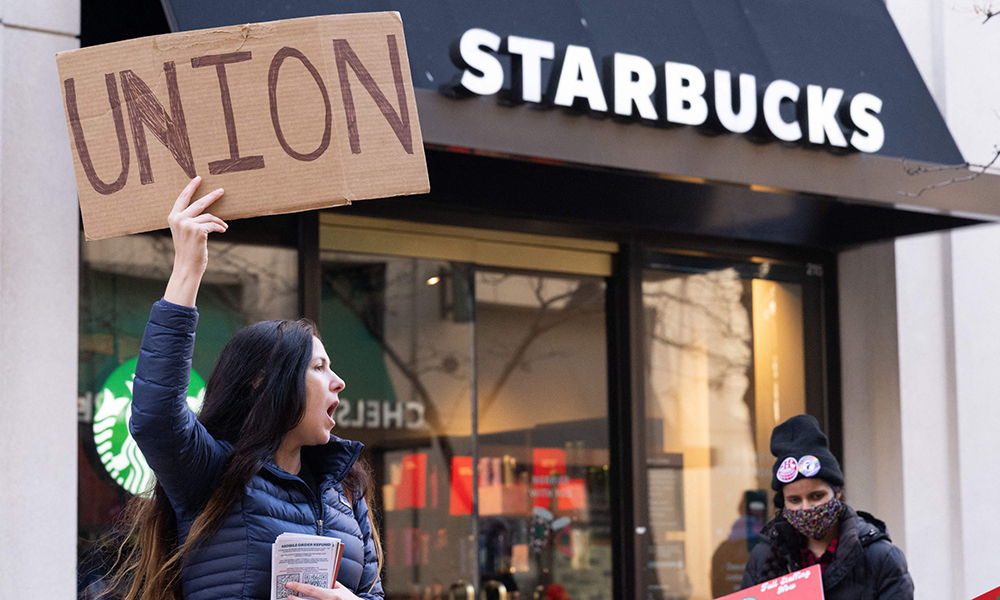
在美国劳动节,有人看到公司与工人之间的冲突加剧,他们不禁会问:“你支持哪一方?”
我理解双方的立场。作为第三代工会成员,我很清楚许多劳动者内心的愤怒,因为他们努力通过加入工会改善自己的生活,却往往会有充满敌意的雇主决心打败他们。但作为一家在工会市场持续增长的保险和投资公司的CEO,我也知道雇主和工人可以站在同一个阵营。
但这需要美国公司自愿地接受,或者更现实一点因为法律强制规定而接受,公司可以繁荣发展并维护其股东的利益,同时也能尊重员工的权利。
成百上千万的劳动者面临低工资、福利稀缺和退休生活毫无保障的前景,而公司利润却在飙升,高管年薪平均达到1,770万美元,因此大多数工人表示想要加入工会。参与工人联合行动的任何人首先都要回答一个问题:我们是否被允许组织工会?公司是否会允许?尽管美国法律在89年前就已经确立了组织工会的权利,但人们依旧会心存疑虑。事实上,雇主已经学会了如何程式化地操纵这种制度。
美国公司每年支付近5亿美元给反工会顾问,以挫败工人组织工会的行动。管理者强迫工人参加一对一的强制会议,并通过盘问工人确定有哪些他们的同事支持工会。接近一半雇主以失去工作威胁工人,而且近五分之一的雇主会把威胁变成实际行动。即使工人克服重重困难取得胜利,雇主也会拖延谈判工会合同中的保护和福利条款,令工人对工会失去信心。
工人克服各种困难的例子令人备受鼓舞,而且工会选举胜利的情况也在大幅增多。这是因为工人希望通过加入工会,争取平均工资上涨10%,获得更安全的工作场所、更有保障的退休生活,以及更有可能享受带薪病假和雇主支付的医疗保险等。
多年前,当工会成员比例最高时,收入不平等程度降至最低,这并非巧合。那段时间是美国中产阶级诞生和经济生产力增长最快的时期。当工会最强大的时候,更多工人和他们的家人过上了中产阶级的生活,这对美国是有利的。我出生在田纳西州的一个工会家庭,因此我亲身体会到了加入工会所带来的财务保障福利。
我的祖父在上世纪50年代加入工会,当时正是工人运动蓬勃发展的时期。这并非巧合——这是富兰克林·罗斯福总统支持《瓦格纳法案》(Wagner Act)的直接结果。他声称该法案旨在保证工人有选举工会的自由。该法案确立了一个信条,即公司不仅要对股东负责,还要对包括员工在内的所有利益相关者负责。该项法案实施之后,美国公司依旧繁荣发展。然而,后来联邦和各州的法律修改,使雇主有更多手段打压组织工会的努力,并恐吓寻求集体力量的工人。
现在我们需要一部新的《瓦格纳法案》。正在等待通过的《保护组织权法案》(PRO Act),或许改成《恢复美国梦法案》更贴切。这样一部法律将规定,公司禁止工人加入工会是违法行为,而且几乎可以肯定的是,大多数美国人一定能在自己的工作场所内建立一家工会。
法律还将使那些尊重工人自由选择权的公司受益,结束公司之间的向下竞争,创造公平的竞争环境。公平保护组织工会的权利,将有助于解决美国生活在贫困中的1,200万儿童的问题。这项法律可以解决一个令人羞愧的问题,即四分之一50岁以上的成年人没有退休储蓄,还能改善越来越多美国人必须从事多份工作才能维持生计的现象。应对贫困问题的一个重要解决方案就是工会。
对于大多数美国人而言,似乎美国的每一天都是“公司节”,却只有一天是在向维持美国经济运行的工人致敬。在这样一个劳动节,无论是遵守规则的公司、希望获得应得的公平待遇的新一代多元化的工人、希望获得他们支持的政治候选人,还是关心美国未来的任何人,所有人应该带头努力,恢复工人组织工会以改善生活的自由。(财富中文网)
本文作者布莱恩·J·黑尔是Ullico公司总裁兼CEO。Ullico是美国唯一一家由工人所有的保险和投资公司。
Fortune.com上发表的评论文章中表达的观点,仅代表作者本人的观点,不能代表《财富》杂志的观点和立场。
译者:刘进龙
审校:汪皓
在美国劳动节,有人看到公司与工人之间的冲突加剧,他们不禁会问:“你支持哪一方?”
我理解双方的立场。作为第三代工会成员,我很清楚许多劳动者内心的愤怒,因为他们努力通过加入工会改善自己的生活,却往往会有充满敌意的雇主决心打败他们。但作为一家在工会市场持续增长的保险和投资公司的CEO,我也知道雇主和工人可以站在同一个阵营。
但这需要美国公司自愿地接受,或者更现实一点因为法律强制规定而接受,公司可以繁荣发展并维护其股东的利益,同时也能尊重员工的权利。
成百上千万的劳动者面临低工资、福利稀缺和退休生活毫无保障的前景,而公司利润却在飙升,高管年薪平均达到1,770万美元,因此大多数工人表示想要加入工会。参与工人联合行动的任何人首先都要回答一个问题:我们是否被允许组织工会?公司是否会允许?尽管美国法律在89年前就已经确立了组织工会的权利,但人们依旧会心存疑虑。事实上,雇主已经学会了如何程式化地操纵这种制度。
美国公司每年支付近5亿美元给反工会顾问,以挫败工人组织工会的行动。管理者强迫工人参加一对一的强制会议,并通过盘问工人确定有哪些他们的同事支持工会。接近一半雇主以失去工作威胁工人,而且近五分之一的雇主会把威胁变成实际行动。即使工人克服重重困难取得胜利,雇主也会拖延谈判工会合同中的保护和福利条款,令工人对工会失去信心。
工人克服各种困难的例子令人备受鼓舞,而且工会选举胜利的情况也在大幅增多。这是因为工人希望通过加入工会,争取平均工资上涨10%,获得更安全的工作场所、更有保障的退休生活,以及更有可能享受带薪病假和雇主支付的医疗保险等。
多年前,当工会成员比例最高时,收入不平等程度降至最低,这并非巧合。那段时间是美国中产阶级诞生和经济生产力增长最快的时期。当工会最强大的时候,更多工人和他们的家人过上了中产阶级的生活,这对美国是有利的。我出生在田纳西州的一个工会家庭,因此我亲身体会到了加入工会所带来的财务保障福利。
我的祖父在上世纪50年代加入工会,当时正是工人运动蓬勃发展的时期。这并非巧合——这是富兰克林·罗斯福总统支持《瓦格纳法案》(Wagner Act)的直接结果。他声称该法案旨在保证工人有选举工会的自由。该法案确立了一个信条,即公司不仅要对股东负责,还要对包括员工在内的所有利益相关者负责。该项法案实施之后,美国公司依旧繁荣发展。然而,后来联邦和各州的法律修改,使雇主有更多手段打压组织工会的努力,并恐吓寻求集体力量的工人。
现在我们需要一部新的《瓦格纳法案》。正在等待通过的《保护组织权法案》(PRO Act),或许改成《恢复美国梦法案》更贴切。这样一部法律将规定,公司禁止工人加入工会是违法行为,而且几乎可以肯定的是,大多数美国人一定能在自己的工作场所内建立一家工会。
法律还将使那些尊重工人自由选择权的公司受益,结束公司之间的向下竞争,创造公平的竞争环境。公平保护组织工会的权利,将有助于解决美国生活在贫困中的1,200万儿童的问题。这项法律可以解决一个令人羞愧的问题,即四分之一50岁以上的成年人没有退休储蓄,还能改善越来越多美国人必须从事多份工作才能维持生计的现象。应对贫困问题的一个重要解决方案就是工会。
对于大多数美国人而言,似乎美国的每一天都是“公司节”,却只有一天是在向维持美国经济运行的工人致敬。在这样一个劳动节,无论是遵守规则的公司、希望获得应得的公平待遇的新一代多元化的工人、希望获得他们支持的政治候选人,还是关心美国未来的任何人,所有人应该带头努力,恢复工人组织工会以改善生活的自由。(财富中文网)
本文作者布莱恩·J·黑尔是Ullico公司总裁兼CEO。Ullico是美国唯一一家由工人所有的保险和投资公司。
Fortune.com上发表的评论文章中表达的观点,仅代表作者本人的观点,不能代表《财富》杂志的观点和立场。
译者:刘进龙
审校:汪皓
On Labor Day, some see the growing clash between corporations and workers and ask, “Which side are you on?”
I’ve seen both sides. As a third-generation union member, I know the anger many working people feel as they struggle to improve their lives by joining together in a union, only to face a hostile employer determined to defeat them. But, as the CEO of a growing insurance and investment company in the union marketplace, I also know employers and workers can be on the same side.
But that will take corporate America to accept—voluntarily or, more realistically, through legal compulsion—that companies can thrive and serve their shareholders, while still respecting the rights of their workers.
As millions of working people struggle with low wages, scarce benefits, and the prospects of an insecure retirement—all while corporate profits soar and executive compensation averages $17.7 million a year—a majority of workers say they want a union. Yet anyone who has been close to an effort by workers to unite knows their first questions: Are we allowed to do this? Will the company permit it? That, despite the fact that the right to a union has been enshrined in U.S. law for 89 years. The truth is employers have learned to routinely game the system.
Corporations spend nearly a half-billion dollars a year on anti-union consultants to defeat workers’ organizing efforts. Managers force workers into one-on-one mandatory meetings and interrogate them to determine who among their co-workers is pro-union. Nearly half of employers threaten workers with job loss, and nearly a fifth follow through on the threat. And when, against all odds, workers win, employers stall negotiating the protections and benefits of a union contract so that workers lose faith.
There are inspiring examples of workers overcoming the odds—union election wins are surging. That’s because workers want the on-average 10% more pay, safer workplaces, secure retirements, and greater likelihood of paid sick leave and employer-paid healthcare that come with a union.
It is no coincidence that years ago when the percentage of workers in unions was highest, income inequality was lowest. Or that that’s when our country’s middle class was born and our economy saw its biggest productivity gains. When unions were strongest, more workers and their families led middle-class lives, and that was good for America. Growing up in a union family in Tennessee, I know first-hand the benefits of the financial security offered by union membership.
My grandfather joined a union in the 1950s during a period of tremendous growth for the labor movement. This was no accident—it was a direct result of President Franklin Roosevelt’s championing of the Wagner Act, which he declared was to ensure that workers had the freedom to choose a union. The act enforced the creed that corporations owed allegiance not only to shareholders but also to stakeholders, including their own employees. With that enforcement, corporate America still thrived. However, later legal changes at the federal and state level have empowered employers to stifle organizing efforts and bully workers who pursue collective power.
It’s time for a new Wagner Act. Waiting in the wings is the PRO Act, which could be more aptly named the Restoring the American Dream Act. Such an act would outlaw much of the corporate behavior that blocks workers from joining a union, and it is a near certainty that the majority of Americans would have what they want—a union in their own workplace.
Such a law would benefit companies that respect workers’ freedom to choose, ending a race to the bottom and leveling the competitive playing field. Fair protection for union organizing would begin to address the 12 million children in the U.S. who grow up in poverty. It could correct the shame that one in four adults older than 50 have no retirement savings, and it would address the growing number of Americans who must work multiple jobs to make ends meet. Poor is a four-letter word, and a big part of the solution is a five-letter word: union.
To most Americans, it seems every day in our country has become Corporation Day, leaving only one day to honor the workers who make America work. On this Labor Day, all of us—companies that play by the rules, a new diverse generation of workers who want and deserve their fair share, candidates for office who want their support, and anyone concerned about the future of America—should lead the effort to restore the freedom of workers to unite in a union to improve their lives.
Brian J. Hale is president and CEO of Ullico Inc., the only labor-owned insurance and investment company in the United States. The opinions expressed in Fortune.com commentary pieces are solely the views of their authors and do not necessarily reflect the opinions and beliefs of Fortune.






